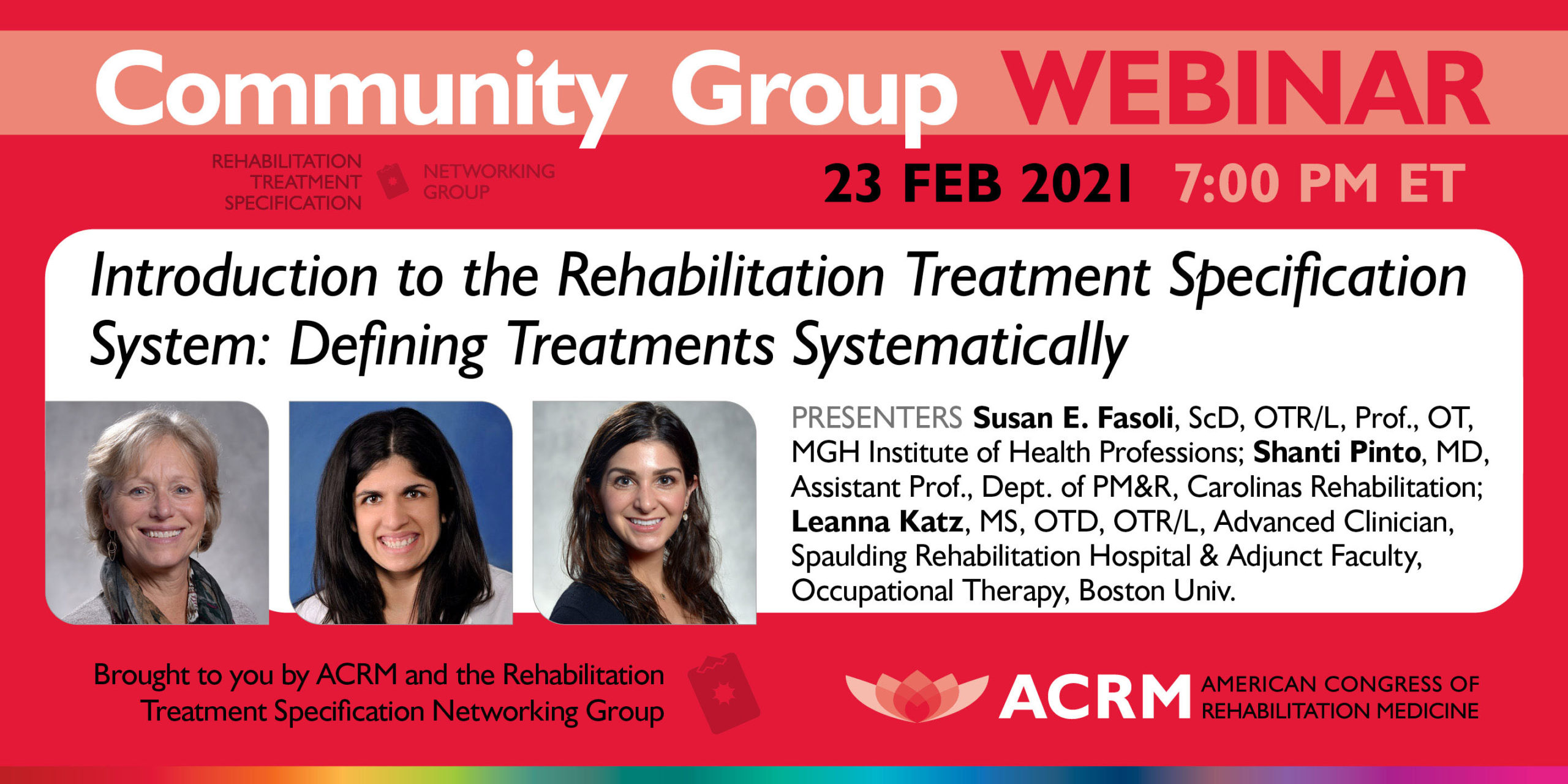RTS Webinar

Introduction to the Rehabilitation Treatment Specification System: Defining Treatments Systematically
With guest speakers, Susan E. Fasoli, ScD, OTR/L, Shanti Pinto, MD, Leanna Katz, MS, OTD, OTR/L and moderator, Susan H. Lin, ScD, OTR/L, FAOTA, FACRM
Have you ever wondered what’s inside the Black Box of rehabilitation treatments? This presentation will describe progress on the NIDILRR and PCORI-funded Rehabilitation Treatment Specification System (RTSS) (formerly Rehabilitation Treatment Taxonomy project) in developing an interprofessional standardized system for defining rehabilitation treatments. Through clinical examples and cases, we will:
- Elucidate the structure, principles, and terminology of the RTSS
- Facilitate reflection about active ingredients and targets of intervention
- Demonstrate how the RTSS can stimulate critical thinking and strengthen clinical reasoning underlying the planning and delivery of interventions
- Describe the benefits of treatment specification, such as enhancing research, practice, clinical education, and communication across disciplines
LEARNING OBJECTIVES
Upon completion of the webinar, learners will be able to:
- Articulate at least two reasons why current methods of describing rehabilitation interventions are insufficient or imprecise
- Apply treatment classification guidelines as articulated by the Rehabilitation Treatment Specification System (RTSS) to enhance clinical reasoning and critical thinking
- Reflect on opportunities to implement RTSS (e.g., document, communicate) in research, education, and practice
ABOUT SUSAN FASOLI
Dr. Fasoli is a professor of occupational therapy at the MGH Institute of Health Professions. She has begun to incorporate the Rehabilitation Treatment Specification System (RTSS) into her teaching to facilitate the development of students’ clinical reasoning skills for evidence-based practice. Her clinical and research expertise is in neurorehabilitation, with an emphasis on the use of robot-assisted therapy and cognitive strategy training for individuals after stroke. Her expertise in outcome measurement and occupational performance provides a strong foundation for examining mechanisms of stroke recovery and the translation of improved upper limb motor function to use of the paretic arm within the home and community. Dr. Fasoli recently stepped down from her role as a section editor for the Archives of Physical Medicine & Rehabilitation. She is an active member of the ACRM RTS Networking Group and Curriculum Task Force and co-chair of the ACRM Stroke Movement Interventions Task Force.
ABOUT SHANTI PINTO
Dr. Pinto is an assistant professor in the Department of Physical Medicine and Rehabilitation, specializing in Brain Injury Medicine, at Carolinas Rehabilitation in Charlotte, NC. She completed her medical education at the University of Pittsburgh Medical School followed by Physical Medicine and Rehabilitation residency and Brain Injury Medicine Fellowship at the University of Pittsburgh Medical Center (UPMC). She has presented at numerous national conferences and received the Best Paper Award for current fellows at the Association of Academic Physiatrists Annual Meeting in 2017 for her presentation entitled “Cost-Efficacy Analysis of Routine Venous Doppler Ultrasound for Diagnosis of Deep Venous Thrombosis at Admission to Inpatient Rehabilitation” and in 2020 for faculty physicians for the presentation “Mild Traumatic Brain Injury is Associated with Increased Dual Task Cost During Ambulation.” She is principal investigator of the Traumatic Brain Injury Model Systems follow-up site at Carolinas Rehabilitation.
ABOUT LEANNA KATZ
Leanna W. Katz, originally from Atlanta, Georgia, received a Bachelor of Science in Brain, Behavior, and Cognitive Science at the University of Michigan in 2010. She later received a Master of Science in Occupational Therapy (January 2015) and a Doctor of Occupational Therapy (September 2016) from Boston University. She joined the Brain Injury Program at Spaulding Rehabilitation Hospital in 2015 and was promoted to advanced clinician in Spring 2017. In December 2018, she transitioned to per diem roles at both Spaulding Rehabilitation Hospital and Shriner’s Hospital for Children. In Fall 2019, Leanna joined the Boston University Occupational Therapy department as adjunct faculty. She is an active member in the ACRM community, participating on various task forces within the Stroke Interdisciplinary Special Interest Group and the RTSS Networking Group, respectively.
ABOUT SUSAN LIN
Susan Lin, ScD, OTR/L, FAOTA is an occupational therapist and health scientist. Dr. Lin is the former Research Director of the American Occupational Therapy Association (AOTA) and is currently the Program Director for the post-professional clinical occupational therapy doctoral program at Marymount University. Her research interests include patient-centered outcomes research, stroke rehabilitation, rehabilitation treatment specification, and health services research. Dr. Lin currently serves on Clinical Trials Advisory Panel of the Patient-Centered Outcomes Research Institute. In addition to serving on the American Congress of Rehabilitation Medicine’s (ACRM) Program Committee, she serves as the Secretary and Chair of the Communications Task Force for the ACRM Rehabilitation Treatment Specification Networking Group. She also reviews for the Journal of Medical Internet Research. Dr. Lin’s contributions have been recognized with the Outstanding Occupational Therapy Alumni Award from Boston University and Fellow Awards from AOTA and ACRM.











